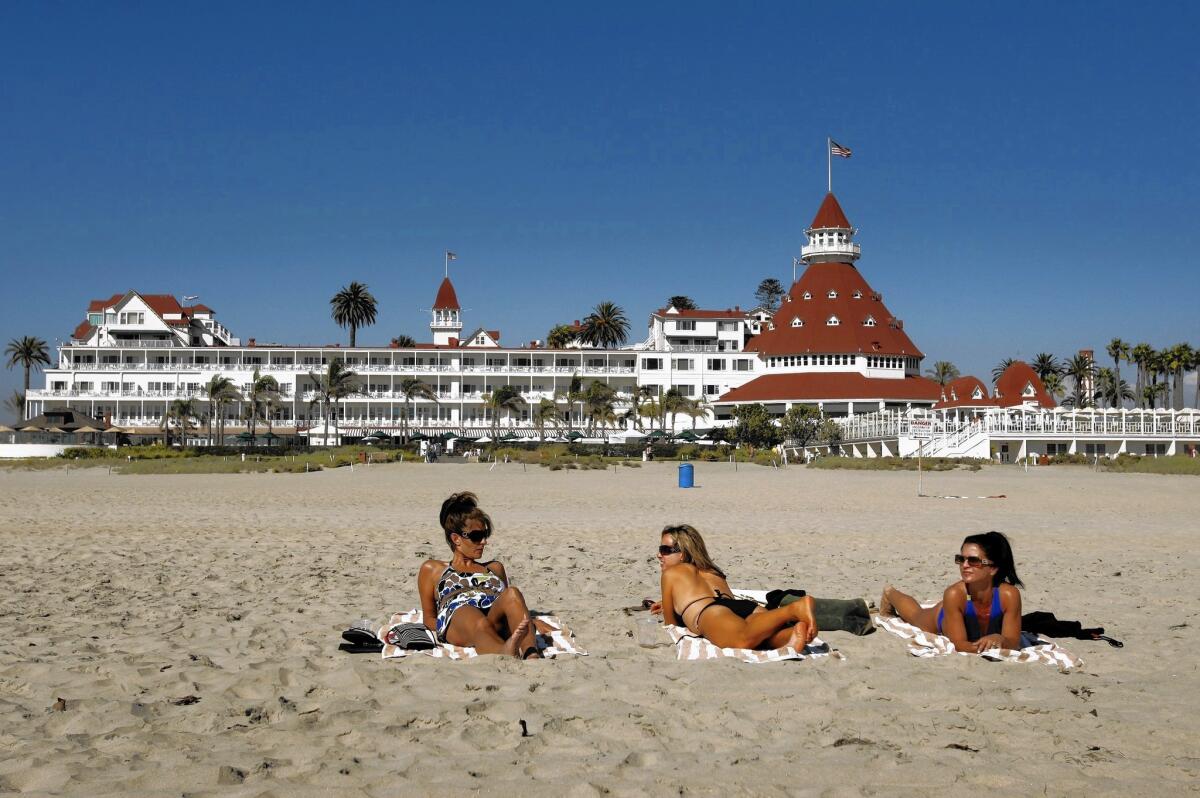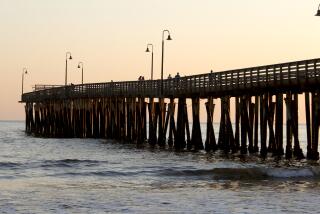Commission still trying to preserve affordable lodging along California coast

- Share via
When the Hotel del Coronado won state approval in 2010 to add 144 rooms, owners of the luxury ocean-view resort agreed to write a check for more than $1 million so that less well-heeled vacationers could afford an overnight stay on the coast — in a hostel.
Five years later, that hostel has yet to be built, but the California Coastal Commission is still trying, as it has for four decades, to enforce a little-known mandate that everyone, regardless of income, is entitled to affordable lodging along the coast.
Though the commission is widely known for its well-publicized efforts to safeguard the public’s access to the water — be it a bayfront promenade in San Diego or a walkway to the beach fronting celebrity-owned homes in Malibu — its mission to preserve affordability has largely flown under the radar.
That long-standing policy will be front and center this week when the commission takes up plans for a 175-room hotel overlooking a marina on Harbor Island. Located on public tidelands, the $30-million project is part of a larger initiative by the Port of San Diego to redevelop the eastern end of the peninsula with 500 hotel rooms, a source of concern among coastal commissioners.
The sticking point remains the same: The overall proposal fails to offer strong-enough guarantees that there will be lower-cost accommodations once the eastern part of Harbor Island is built out with new, possibly upscale hotels, the commission staff asserts. It is recommending denial.
The planned hotels have had a ripple effect far beyond San Diego’s bayfront. The project has spurred the commission to reassess a well-intentioned policy that has yet to produce a significant volume of lodging options for middle-class families and individuals who can’t afford to stay in an ocean-view resort where nightly rates can top out at $600.
“The ability for all populations of all economic levels to have access to the coast is as threatened as many of our most troubled species for reasons that we only have one coast, and it’s easy in a market economy to sell it to the highest bidder,” commission Chairman Steve Kinsey said during a December workshop on the issue.
The notion that everyone deserves an affordable place to vacation on the coast has its roots in the early 1970s, when a statewide coastal plan was being crafted. Written into the Coastal Act was a specific section to protect and, “where feasible,” provide lower-cost visitor facilities, which can include overnight lodging.
In the 40 years since, the commission has had mixed success as pressure has grown to swap out budget motels and quaint inns with pricey ocean and bay-view resorts along the coast.
Hundreds of hostel beds have been provided in Santa Monica, campsites developed, aging beachfront cottages restored in Crystal Cove, and more than $19 million in affordable lodging fees collected. But nearly $10 million remains uninvested, and not a single discounted room has been included in a new hotel development. In San Diego County, no new affordable lodging has come about, although fees have been levied in recent years as part of hotel developments.
“The hotel operators and the financiers of these substantial projects see high end and low end as oil and water and don’t really want to mix them up together, which is why we came up with this per-room formula to fund lower-cost accommodations in the vicinity,” said Kinsey, a Marin County supervisor. “That approach sounds good, but it hasn’t proven to be effective.”
The millions of dollars the commission has collected over the years is not actually held by the agency but passed on to other entities such as the state parks department, the California Coastal Conservancy, hostel operators and local governments to be spent later.
The idea that public coastal access has been translated into an edict for affordable lodging is overreaching, says San Diego hotelier Bob Rauch.
“I can’t think of a reason why it should be mandated,” said Rauch, who owns and operates a number of hotels. “The value of the land is what impacts the price of a room, but if you want to be able to afford an overnight stay in coastal California, you should pay for it.”
The commission has held two workshops on the affordability mandate, and a third is scheduled later this year. One idea being considered is establishing a loan fund to help prop up budget motels in need of an upgrade or more partnerships with the state park system for developing innovative camping options.
“The commission’s efforts to date has been subsidizing hostels or state park campgrounds,” said consultant Maurice Robinson, who has been voluntarily advising the commission. “They’re going after the low-hanging fruit because those are relatively cheap, but they haven’t produced a single low-cost motel room.”
Also adding to the commission’s challenges is a 1981 change in the Coastal Act that not only prohibits it from setting room rates for privately owned and operated hotels, but also bars it from defining who qualifies for lower-priced lodging.
In the absence of a clearly defined statewide policy on how to fairly finance such lodging, the San Diego Unified Port District has launched its own study to quantify what developer fees should be and how best to spend the money.
In the meantime, the port’s staff has agreed to a still unspecified in-lieu fee that would be paid by San Diego-based Sunroad Enterprises, developer of the planned 175-room hotel on Harbor Island. It also has committed to reserve at least 25% of the future 325 hotel rooms on the site as “mid-scale or economy.”
Not good enough, says the commission’s staff. A lower-cost hotel room in San Diego is closer to $106 a night, and “it is very unlikely that the market rate of new hotel rooms on the waterfront developed as an economy product — let alone a mid-scale product — would fall into this category,” reads the staff report.
Sunroad executives declined to comment.
Though San Diego County still has nothing to show for the commission’s affordability mandate, recent hotels proposed for Liberty Station and Lane Field near the waterfront have been required to pay fees totaling $7 million, which have yet to be spent or earmarked for projects.
The developers of the two high-rise hotels planned for Lane Field, one of which is under construction, had initially considered doing a hostel as part of the project but quickly found it wouldn’t pencil out and instead agreed to fees of $6 million.
“We respect the approach and reasoning behind the commission’s policy, and for any developer going to the San Diego waterfront, that’s the price of admission,” said John Portman IV, a vice president with John Portman & Associates, an architectural firm that designed the Lane Field hotels. “We certainly talked about the hostel, but at the end of the day it made more sense for us to just pay the fee.”
MORE ON REAL ESTATE:
Interactive: Where can you afford to live?
Darren McFadden sells Oakland home with a view for above asking price
Long Beach high-rise sells at $45-million discount despite ‘mesmerizing’ view
More to Read
Sign up for Essential California
The most important California stories and recommendations in your inbox every morning.
You may occasionally receive promotional content from the Los Angeles Times.










